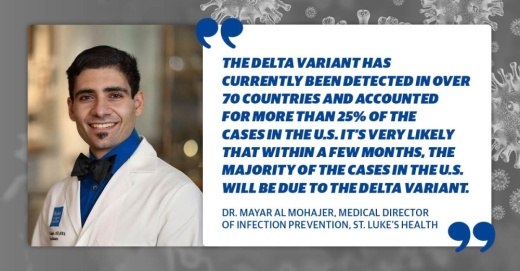What is the situation with COVID-19 in Houston?
In terms of the Houston area, the number in the Greater Houston area has been decreasing steadily over the past few months. Since February we have declined in cases. Now, we have had around maybe 130 cases in the Greater Houston area in the last week. For perspective, in May we were at about 300 cases a day, and before that we were at 1,000. So we have seen a significant reduction. Also, the percentage of positive cases has decreased. We are close to 3% where before we were over 10%. All of this indicates that we are doing a really good job with controlling COVID[-19].
However, for maybe two or three weeks we've noticed that the number has been stagnating for a couple of reasons. We have close to 50% of the people who are 12 years and older vaccinated. That’s really been the major reason why we have seen this reduction. The problem is the rate of vaccination has stagnated in Texas, and it’s much worse in states that are east of us where they have much lower vaccination rates.
What COVID-19 variants are at play right now, and how does the delta variant fit into that?
One of the problems is that not all of the cases are tied to a variant. We don't have that information for every single case, but we do have a snapshot. In the past couple of months, we had the Alpha variant—formerly called the British variant. That has been the dominant variant in the U.S. That has been associated with increased transmissibility and hospitalization. It’s estimated that the Alpha variant was 50% more virulent compared to the original one that was reported in China.
That has been changing over the past few weeks. We noticed popular variants are increasing. One is the Beta variant—the one that originally started in South Africa—and more recently we’ve seen the delta variant, the one originally described in India. The delta variant has currently been detected in over 70 countries and accounted for more than 25% of the cases in the U.S. It’s very likely that within a few months, the majority of the cases in the U.S. will be due to the delta variant.
Cities like Los Angeles are urging residents to mask up—even the vaccinated—and you even have organizations like the World Health Organization recommending people to mask up because of the variant. Should we be concerned about masks and social distancing measures being put in place once more?
The good news is that all vaccines will protect against severe diseases from the delta value. Researchers from one paper found that if you received the Pfizer or AstraZeneca vaccines, your chance of not getting a severe disease from the delta variant was over 90%. Moderna, a couple of days ago, also had similar results. We still don't have data for Johnson & Johnson. So that means that if you get the vaccine that's the best way.
The situation we have in the U.S. is that we haven’t reached herd immunity yet, and there are areas, particularly in the southeastern United States, where they have pockets of low vaccination rates. That’s created some geographical locations where the delta variant can spread and can lead to increased transmission and hospitalization. We might have two versions of the U.S., one where the majority of people are vaccinated and they can resume their lives like pre-COVID[-19], and then you have other areas where the vaccination rate is low and the virus could be transmitted quickly and where it might be reasonable to discuss wearing masks.
So if you’re vaccinated, you don’t need to worry about it.
What can you say about the COVID-19 vaccine currently undergoing clinical trials, Novavax?
I know that they are planning to vie for [Food and Drug Administration] approval but I believe that's going to be in the next couple of months. Novavax from what I’ve seen is similarly effective to what we have, so it’s 90% efficacy overall, and effective against those variants of concern as well. So I think it will be an additional tool and an alternative option. I think it's really exciting to see that we have more and more vaccines to present so that we can have them available for other people in the world. The more vaccines we have, the more can prevent global transmission worldwide, which will also lead to a decreased chance of developing new mutations and new variants that could come back to us.





